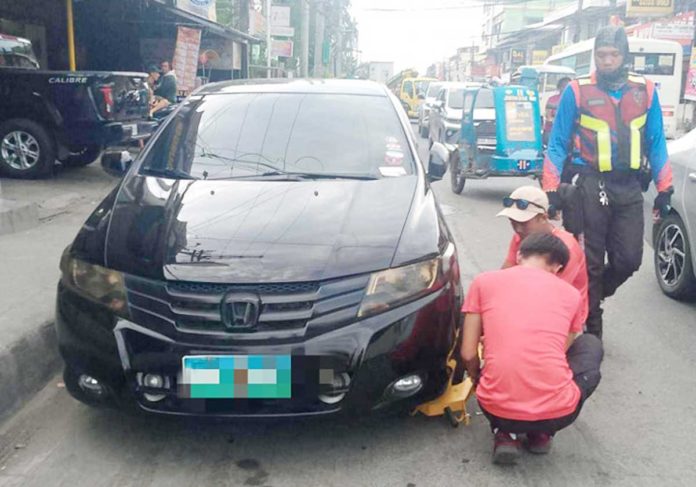
BY GEROME DALIPE IV
ILOILO City – The city government’s Traffic and Transportation Management Office (TTMO) has started implementing the amended clamping ordinance to address the persistent issue of illegally parked vehicles on major streets.
By clamping vehicles that violate parking regulations, the ordinance aims to enforce stricter compliance, reduce traffic congestion, improve traffic flow, reduce congestion, and enhance road safety.
The initiative is expected to serve as a deterrent to illegal parking, ensuring that streets are kept clear for smoother traffic movement and accessibility.
The move is also expected to encourage drivers to adhere to designated parking rules, thereby contributing to a more organized and efficient traffic system in the metropolis.
Vehicles found in violation of parking regulations will be clamped and released only upon payment of fines and penalties.
But a jeepney driver earlier cried foul after traffic office personnel clamped his vehicle while he was replacing a flat tire.
The driver said he just went to a nearby vulcanizing shop to have his vehicle’s tire repaired. However, the traffic personnel installed the clamp on his vehicle and ordered him to pay P1,200 as a fine for traffic violations.
The driver expressed his frustration, saying they were unfairly targeted by the ordinance as he was dealing with a mechanical issue — replacing a flat tire — when his vehicle was clamped by traffic office personnel.
This incident highlights the need for clear guidelines and discretion in enforcement, especially in situations where a vehicle is temporarily immobilized due to unforeseen circumstances like repairs.
So when can traffic personnel clamp a vehicle deemed illegally parked on the streets under the clamping ordinance?
Under the city’s towing/clamping ordinance, the measure noted the primary purpose of clamping is to crack down on unauthorized or illegal parking of vehicles, including abandoned, damaged, or repaired vehicles.
Hence, the traffic personnel may also clamp a vehicle deemed illegally parked on the streets only after any police officer, traffic enforcer, and agent of the Land Transportation Office (LTO) has issued a citation ticket for violation of the on-road parking ordinance of the city. The “no citation ticket, no clamping of vehicle policy” shall be implemented at all times.
The other guidelines and procedures include:
* The presence of the police officer, traffic enforcer, and LTO agent who issued the citation ticket during the clamping of the offender’s motor vehicle is necessary and indispensable.
* The city government or any private entity authorized by the city government to engage in clamping or towing business shall make sure that the wheel clamp is in good working condition and suited before every use.
* The wheel clamp must be carefully attached to one (1) of the tire assemblies on the safe side where any accidental and unnecessary damage to the vehicle itself and other cars and/or injury to passing pedestrians may be avoided.
* The wheel clamp shall only be removed upon presentation of an official receipt issued by the City Treasurer’s Office or by a private entity authorized by the city government showing the payment of fees as prescribed hereunder.
* In cases where clamping was simply used to immobilize vehicles that were eventually towed and impounded, the clamping fee shall be waived, in which case, only the towing fees shall be exclusively charged and collected from the violator together with the corresponding fine for illegal parking.
* The vehicle shall be released to the custody of the owner/driver upon verification of his identity and presentation of proof of ownership or legal possession of the vehicle.
* In case of doubt on the right to possess the vehicle by the driver/claimant, release thereof shall be made to and/or in the presence of the registered owner.
* Whenever the driver is inside the car or has timely arrived and voluntarily removed his vehicle before the complete attachment of a wheel clamp, clamping may be called off.
Instead, the violator shall be issued a citation ticket and shall be required to pay the fine for illegal parking with the City Treasurer’s Office.
In case the driver is nowhere to be found after the wheel clamp is completely attached to the vehicle, a duplicate copy of the citation ticket must be posted or affixed to the vehicle whichever means deemed feasible and appropriate under the circumstances by the apprehending officer.
Violators will be fined P1,000 for light vehicles, P1,200 for medium vehicles, and P1,500 for heavy vehicles, with a P5,000 penalty for unauthorized removal, destruction, disfiguration, or defacing of the wheel clamp.
The city government purchased 40 medium wheel clamps, 20 large wheel clamps, and 50 motor wheel clamps./PN



